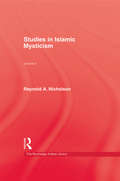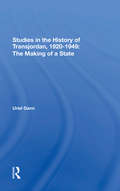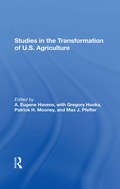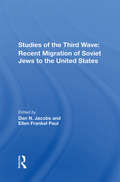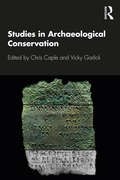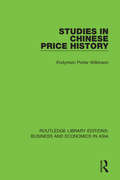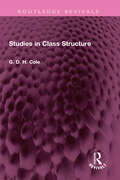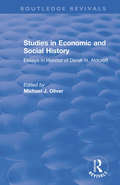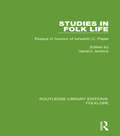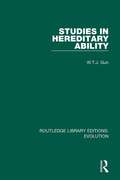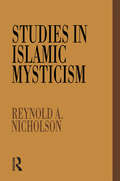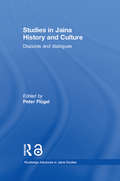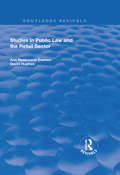- Table View
- List View
Studies In Islamic Mystic
by NicholsonFirst published in 1998. Routledge is an imprint of Taylor & Francis, an informa company.
Studies In Shinto & Shrines
by R. A. Ponsonby-FaneFirst Published in 2005. Written by one of the leading scholars on Japanese culture, this focus of this collection of papers centres on Shinto rites and festivals and shrine buildings. Among the topics covered are the imperial family and Shinto, the three great emperors, Yatagarasu, Yasoshima-No-Matsuri and Kamo Gejo Ryosha. Eleven shrines are discussed in detail, including Tatsuta Jinja, Aso Jinja and Suminoe-No-Okami. Readers will enjoy the book's fascinating subject matter, clear presentation and entertaining style.
Studies In The History Of Transjordan, 1920-1949: The Making Of A State
by Uriel DannThis collection of papers examines, in the inductive manner of political history, a number of events and crises from 1920 to 1949 that have shaped the modern state of Jordan, describing the when, the how, and the why.
Studies In The Transformation Of U.S. Agriculture
by Gregory Hooks Max Pfeffer Patrick H Mooney A. Eugene HavensIn recent years, the consensual view of rural society has been challenged by theorists identifying the conflict, exploitation, and power relations in rural society. Beyond this theoretical challenge, empirical studies of the sociology of agriculture have provided a fresh understanding of the dynamics of U.S. agriculture. This book contributes to the growing literature by providing a historical perspective. The contributors explore historical developments in U.S. agriculture within the context of the larger political economy. The book opens with a review of the similarities and differences between the critical rural sociology of today with that of the 1930s and moves on to a study of the accumulation process in U.S. agriculture. Other issues covered include the erosion of the southern class structure during and after the 1930s, the landed aristocracy's reassertion in the post-bellum south, changes in the class structure and locus of agriculture in the midwest, and historical developments in the labor process and in capitalist agriculture in California. The concluding chapter provides a framework for studying both the origins and the consequences of state agriculture policies.
Studies Of The Third Wave: Recent Soviet Jewish Immigration To The United States
by Dan A Jacobs Ellen F PaulDuring the 1970s the Soviet Union allowed large numbers of its citizens to emigrate, the first major group allowed to leave in five decades. The number of emigres peaked in 1979, with 50,000 persons leaving the USSR—most of them Soviet Jews, most of them bound for the United States. This book studies this most recent of three major influxes of Soviet Jews into the United States. Using case studies based on six major cities, it considers where the immigrants came from, why they came, how they feel about the Soviet regime and people, what their occupations were in the USSR, and how they are adjusting to social and professional life in the United States. Their responses are compared with those of earlier immigrants to draw conclusions about the role the "third wave" may play in U.S. life. The interviews also shed light on current political, social, and economic conditions in the Soviet Union.
Studies in Ancient Persian History (Routledge Library Editions: Iran)
by P. KershaspThis volume lays the foundation of a “correct” view of ancient Persian history, which, in the author’s opinion, had hitherto been approached from a “biased standpoint.” It presents a survey of ancient and modern historians such as Gibbon, Malcolm and Rawlinson and critiques their work – either for having too much partiality for Greek and Latin writers, not being conversant with the literature of the East or not doing justice to the ancient Persians. Arab and Persian historians are also discussed and social, literary, legal, religious, economic and political questions examined.
Studies in Archaeological Conservation
by Chris Caple Vicky GarlickStudies in Archaeological Conservation features a range of case studies that explore the techniques and approaches used in current conservation practice around the world and, taken together, provide a picture of present practice in some of the world-leading museums and heritage organisations. Archaeological excavations produce thousands of corroded and degraded fragments of metal, ceramic, and organic material that are transformed by archaeological conservators into the beautiful and informative objects that fill the cases of museums. The knowledge and expertise required to undertake this transformation is demonstrated within this book in a series of 26 fascinating case studies in archaeological conservation and artefact investigation, undertaken in laboratories around the world. These case studies are contextualised by a detailed introductory chapter, which explores the challenges presented by researching and conserving archaeological artefacts and details how the case studies illustrate the current state of the subject. Studies in Archaeological Conservation is the first book for over a quarter of a century to show the range and diversity of archaeological conservation, in this case through a series of case studies. As a result, the book will be of great interest to practising conservators, conservation students, and archaeologists around the world.
Studies in Biblical and Semitic Symbolism
by Maurice H. FarbridgeThis is Volume II in series of six on the Ancient Near East. Originally published in 1923, adding to an important a branch of Biblical and Semitic Studies this study looks biblical and Semitic symbolism.
Studies in British Society (Routledge Revivals)
by J. A. BanksFirst published in 1969, Studies in British Society contains excerpts from seven major studies of modern British society – studies that demonstrate the special techniques used by sociologists in researching various aspects of social behaviour. The selections reflect the full spectrum of life in modern Britain. Included are the studies of the impact of new industry on the structure of an old English town; management-labour relations in the coal industry; the nature of a minor religious sect; democratic participation in a retail cooperative society; life in an English prison; class factors in education; and child-rearing practices in an urban community. This book will introduce the reader to some of the major work of modern British sociologists, and also help him to gain greater insights into the nature of life in Britain.
Studies in Canadian Geography: Ontario
by R. Louis GentilcoreOntario is the most populous and most prosperous province in Canada. One-third of the nation's population lives here. They produce more than one-half of Canada's manufactured goods, one-quarter of her output from mines and forests, and one-third of the farm income. Accompanying this economic pre-eminence is a majestic primeval geography. Ontario extends through sixteen degrees of latitude and a distance of over 1600 kilometres from barren tundra along a saltwater shoreline in the north to fertile lowlands bordering freshwater lakes in the south. Productivity and size, two of the basic elements in the geography of the province, stand in contradiction to one another. The former is concentrated in a very small area with an identity and even a name of its own, 'Southern Ontario,' a portion of the province that is as overwhelming in its concentration of activity as the remainder is in its areal extent. The recognition of this distinction is a prerequisite to the further study of a subject which has been widely neglected, both in Ontario and in the rest of Canada. Writers and artists, historians and geographers have paid little attention to the province. It is a baffling region, one which 'has achieved a significant place in the Canadian sun, but no one quite knows what the place is, even though other areas would like to achieve the same position' (Warkentin 1966). The purpose of this short volume is to contribute to an understanding of Ontario, to point out something of what it is both to those who are already acquainted with the province and to those who are being introduced to it for the first time.
Studies in Chinese Price History (Routledge Library Editions: Business and Economics in Asia #31)
by Endymion Porter WilkinsonThis book, first published in 1980, uses a body of original documentary sources (some 5000 district grain price reports) to quantify, in the form of exchange and price zones, the relationships between the exchange markets and the grain markets of ninety district towns in Shensi, a province in China. Through this study there emerges a detailed picture of a near subsistence agricultural economy.
Studies in Class Structure (Routledge Revivals)
by G.D.H. ColeFirst published in 1955, Studies in Class Structure contains six studies in problems of social structure, relating mainly to contemporary British society. Professor Cole studies an analysis of the information about class structure contained in the British Census of 1951; and he also deals with the changes in British class structure during the past hundred years. He considers the structure of elites in contemporary Britain, with some account of their development. He is also concerned with the influence of technical changes on class structures in Europe. These studies do not pretend to embody a comprehensive treatment of the problems of social structure: each of them stands by itself as a sharply original treatment of the many facets of class structure. This book will be of interest to students of economics, sociology and history.
Studies in Crime: An Introduction to Forensic Archaeology
by Charlotte Roberts John Hunter Mark Pollard Carol Heron Geoffrey Knupfer Anthony MartinThe study of forensic evidence using archaeology is a new discipline which has rapidly gained importance, not only in archaeological studies but also in the investigation of real crimes. Archaeological evidence is increasingly presented in criminal cases and has helped to secure a number of convictions.Studies in Crime surveys methods of searching for and locating buried remains, their practical recovery, the decay of human and associated death scene materials, the analysis and identification of human remains including the use of DNA, and dating the time of death.The book contains essential information for forensic scientists, archaeologists, police officers, police surgeons, pathologists and lawyers. Studies in Crime will also be of interest to members of the public interested in the investigation of death by unnatural causes, both ancient and modern.
Studies in Economic and Social History: Essays Presented to Professor Derek Aldcroft (Routledge Revivals)
by Michael J OliverThis title was first published in 2002: There are few students of European economic history who will not have come across the writings of Derek H. Aldcroft. His contributions to the field of economic and social history are vast and distinguish him as one of the most prolific economic historians of the 20th century. This volume honours Derek's contribution to the literature of economic and social history and its contents reflect his wide-ranging interests, particularly on issues relating to transport history and the growth and structural change in economies. From transport in the Industrial Revolution to late 20th-century international financial architecture, the essays in this book, contributed by leading economic historians, are a tribute to a remarkable scholar.
Studies in Environment and History: Across Forest, Steppe, and Mountain
by David A. BelloIn this book, David Bello offers a new and radical interpretation of how China's last dynasty, the Qing (1644–1911), relied on the interrelationship between ecology and ethnicity to incorporate the country's far-flung borderlands into the dynasty's expanding empire. The dynasty tried to manage the sustainable survival and compatibility of discrete borderland ethnic regimes in Manchuria, Inner Mongolia, and Yunnan within a corporatist 'Han Chinese' imperial political order. This unprecedented imperial unification resulted in the great human and ecological diversity that exists today. Using natural science literature in conjunction with under-utilized and new sources in the Manchu language, Bello demonstrates how Qing expansion and consolidation of empire was dependent on a precise and intense manipulation of regional environmental relationships.
Studies in Ethnomethodology
by Harold GarfinkelEthnomethodology involves a multifaceted focus on the local social orders.
Studies in Folk Life: Essays in Honour of Iorwerth C. Peate (Routledge Library Editions: Folklore)
by Geraint JenkinsThis collection, first published in 1969, presents essays written by twenty of the most eminent scholars from the British Isles and Europe on aspects of folk life studies. The essays are written in honour of Dr Iorwerth C. Peate, Curator of the Welsh Folk Museum and doyen of folk life studies in Britain, to mark his retirement as the first President of the Society for Folk Life Studies. In the present book all the various aspects of folk life, from linguistics to sociology, from architecture to agrarian history, are covered, reflecting the wide interests of Dr Peate and his valuable contribution to the development of the study of traditional life in Britain.
Studies in Hereditary Ability (Routledge Library Editions: Evolution #4)
by W.T.J. GunOriginally published in 1928, Studies in Hereditary Ability studies the genealogy of great families of Britain and America and examines how their ancestors influenced their genetics and who they subsequently ended up becoming. The book examines the descent of ability through both maternal and paternal lines, and seeks to argue that from both sides, there stems an equal chance of inheritance. At the time of publication maternal genealogy was relatively unexplored and the book examines the influence of the maternal line on hereditary genetics, as well as the early influence of the mother on a child’s environment. The book also examines the links between leadership and intelligence, and maps the genealogy of writers, scientists and artists, and proposes that these notable figures were more likely to have had notable relatives. Although very much of its time, the book will provide a unique and interesting read for social historians, anthropologists and genealogists alike.
Studies in Intellectual History
by George BoasOriginally published in 1953. In this collection of essays, prominent midcentury intellectual historians provide critical essays on their field of specialty. Studies in Intellectual History gathers work by Harold Cherniss, George Boas, Ludwig Edelstein, Leo Spitzer, and others.
Studies in Islamic Mysticism
by Reynold A. NicholsonA re-issue in paperback of Nicholson's classic survey of the field of Islamic mysticism. Intended as reading for students of sufism, philosophy and literature, it also provides an introduction to the translations of both R.A. Nicholson and A.J. Arberry.
Studies in Jaina History and Culture: Disputes and Dialogues (Routledge Advances in Jaina Studies)
by Peter FlügelThe last ten years have seen interest in Jainism increasing, with this previously little-known Indian religion assuming a significant place in religious studies. Studies in Jaina History and Culture breaks new ground by investigating the doctrinal differences and debates amongst the Jains rather than presenting Jainism as a seamless whole whose doctrinal core has remained virtually unchanged throughout its long history. The focus of the book is the discourse concerning orthodoxy and heresy in the Jaina tradition, the question of omniscience and Jaina logic, role models for women and female identity, Jaina schools and sects, religious property, law and ethics. The internal diversity of the Jaina tradition and Jain techniques of living with diversity are explored from an interdisciplinary point of view by fifteen leading scholars in Jaina studies. The contributors focus on the principal social units of the tradition: the schools, movements, sects and orders, rather than Jain religious culture in abstract. Peter Flügel provides a representative snapshot of the current state of Jaina studies that will interest students and academics involved in the study of religion or South Asian cultures.
Studies in Legal History: Fractional Freedoms
by Mckinley Michelle A.Fractional Freedoms explores how thousands of slaves in colonial Peru were able to secure their freedom, keep their families intact, negotiate lower self-purchase prices, and arrange transfers of ownership by filing legal claims. Through extensive archival research, Michelle A. McKinley excavates the experiences of enslaved women whose historical footprint is barely visible in the official record. She complicates the way we think about life under slavery and demonstrates the degree to which slaves were able to exercise their own agency, despite being ensnared by the Atlantic slave trade. Enslaved women are situated as legal actors who had overlapping identities as wives, mothers, mistresses, wet-nurses and day-wage domestics, and these experiences within the urban working environment are shown to condition their identities as slaves. Although the outcomes of their lawsuits varied, Fractional Freedoms demonstrates how enslaved women used channels of affection and intimacy to press for liberty and prevent the generational transmission of enslavement to their children.
Studies in North American Indian History: Apache Adaptation to Hispanic Rule
by Matthew BabcockAs a definitive study of the poorly understood Apaches de paz, this book explains how war-weary, mutually suspicious Apaches and Spaniards negotiated an ambivalent compromise after 1786 that produced over four decades of uneasy peace across the region. In response to drought and military pressure, thousands of Apaches settled near Spanish presidios in a system of reservation-like establecimientos, or settlements, stretching from Laredo to Tucson. Far more significant than previously assumed, the establecimientos constituted the earliest and most extensive set of military-run reservations in the Americas and served as an important precedent for Indian reservations in the United States. As a case study of indigenous adaptation to imperial power on colonial frontiers and borderlands, this book reveals the importance of Apache-Hispanic diplomacy in reducing cross-cultural violence and the limits of indigenous acculturation and assimilation into empires and states.
Studies in North American Indian History: Indigenous Intellectuals
by Kiara M. VigilIn the United States of America today, debates among, between, and within Indian nations continue to focus on how to determine and define the boundaries of Indian ethnic identity and tribal citizenship. From the 1880s and into the 1930s, many Native people participated in similar debates as they confronted white cultural expectations regarding what it meant to be an Indian in modern American society. Using close readings of texts, images, and public performances, this book examines the literary output of four influential American Indian intellectuals who challenged long-held conceptions of Indian identity at the turn of the twentieth century. Kiara M. Vigil traces how the narrative discourses created by these figures spurred wider discussions about citizenship, race, and modernity in the United States. Vigil demonstrates how these figures deployed aspects of Native American cultural practice to authenticate their status both as indigenous peoples and as citizens of the United States.
Studies in Public Law and the Retail Sector
by Ann R Everton David J HughesThis title was first published in 2000: Part 1 Shifting patterns of retailing - a journey to and through the "golden age": highlights of the earlier history; the post-war decades - the '50s, '60s and '70s; the "retail revolution" of the '80s - the creation of the "golden age"; the early and middle '90s - less certain times...and a "watershed". Part 2 Planning control and retail developments: the policy; policy into practice - the law in operation. Part 3 Competition law and policy and retailing: preliminary observations; the domestic law - up to the Competition Act 1998; domestic law reform - the new Act; the European law; the approach to price discrimination and mergers; a consideration of certain further major issues. A postscript - in the "millennium spirit".
